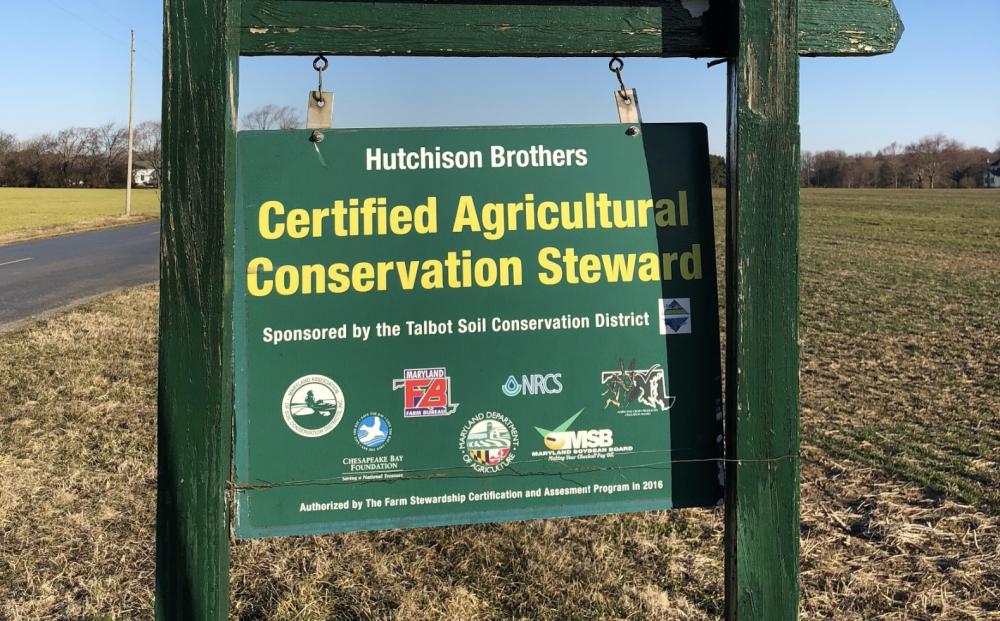After often hearing about the innovative Hutchison Brothers farm operation in Cordova, I finally got to meet two of the brothers and one of their sons. I experienced their down-to-earth manner in discussing widely acclaimed success and a sincere, time-proven fealty to improving the land.
 Profit is number one, followed closely by environmental sustainability. Simply, the family is quick to use excess funds to adopt creative best management practices to nourish the land and upgrade water quality.
Profit is number one, followed closely by environmental sustainability. Simply, the family is quick to use excess funds to adopt creative best management practices to nourish the land and upgrade water quality.
For its environmentally stewardship over the years, often leading the farm industry on the Eastern Shore, Hutchison Brothers is the 2019 recipient of Horn Point Laboratory’s (HPL) Chesapeake Champion for the Environment Award. It will be presented on Thursday, May 30, 5 p.m. to 7 p.m., at the Waterfowl Chesapeake Building in Easton.
The seventh annual winner of this honor, Hutchison Brothers Farm, will be the first farmers to receive it. That’s noteworthy.
When I met recently with Bobby Hutchison, his brother Richard and nephew Kyle to write a freelance article for HPL, I found myself impressed by a sophisticated farm operation that is driven to produce better and better yields—naturally so—while equally devoted to conservation.
Nitrogen (fertilizer), as well as phosphorus, have long been considered primary culprits in degrading the health of the Chesapeake Bay and its tributaries. Environmental groups have frequently criticized farmers for their obsession with yields and supposed indifference to the impact of nitrogen on water quality. This criticism would not apply to the Hutchisons.
So what have the Hutchison Brothers done in its usage of nitrogen?
The family, for example, uses of state-of-the-art equipment to allocate fertilizer in a way that discourages excess, using only what is needed in particular fields. Some fields, already richly productive, need less nitrogen than other fields containing poorer soil.
Tom Fisher, an HPL scientist who has worked closely in the past few years with farmers to use best management practices to enhance water quality, said, “Many of the (the Hutchison Brothers’) new ideas are based on putting the right kind of fertilizer on the right place, and the right time that crops need fertilizer. This should be a win-win, reducing farmers’ fertilizer costs, decreasing losses from their farms to nearby streams and improving downstream water quality.”
I’m no farmer. That’s clear. But I understand the decision-making necessary to balance need and soil management. Profit, investment and environmental benefit—this triad requires a tricky thought process.
I’ve attended every Chesapeake Champion celebration. My wife used to work at HPL. Each one is different and impressive. Recipients–from restaurant owners committed to farm-to-table ingredients to landowners who have established wildlife refuges, to a longtime volunteer and leader in a local environmental organization, to a creator of an unusual and well-respected inventory of Maryland plants and fauna—have made a substantial commitment to preservation of our area’s rural character.
The Hutchison Brothers bring another dimension to the constellation of Chesapeake Champions. Yes, they love their 3,400 acres, Yes, they love being a successful farm operation. And, notably, they have combined pursuit of high yields with consistent land stewardship
Farming is a serious business subject to the vagaries of the weather and international market conditions. It requires skill in planting, marketing and cost control. It requires risk and flexibility. It requires humility and perseverance.
When the Hutchison Brothers receive the Chesapeake Champion award, they surely will feel proud. They also will believe that their focus on financial success and environmental stewardship is feasible.



Write a Letter to the Editor on this Article
We encourage readers to offer their point of view on this article by submitting the following form. Editing is sometimes necessary and is done at the discretion of the editorial staff.